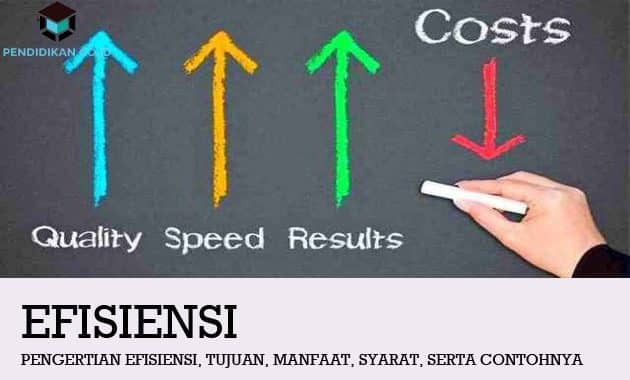Definition of Efficiency, Objectives, Benefits, Terms, and Examples
Education. Co. ID – This time we will discuss about Efficiency, in this explanation we will also present several points that will explain this efficiency, the full explanation is below:

Definition of Efficiency
This definition of efficiency is a measure of the level of success of an activity or activity which is assessed based on the amount of costs/resources used to achieve desired results desired.
In this case, the fewer resources used to achieve the expected results, the more efficient the process can be. An activity or activity can be said to be efficient if there is an improvement in the process, for example being faster or cheaper.
According to the Big Indonesian Dictionary (KBBI), this efficiency can be interpreted as the accuracy of the way in do something, as well as the ability to carry out tasks properly and precisely without wasting money, time, and money power.
Understanding Efficiency According to Experts
In order to better understand what efficiency means, we can refer to several expert opinions. Below is an understanding of efficiency according to experts, including the following:
1. According to Mulyamah (1987;3)
This definition of efficiency is a measure in comparing a planned input use with realized use or in other words the actual use
2. According to S. P. Hasibuan (1984;233-4)
This definition of efficiency is a comparison of the best between inputs (inputs) and outputs (intermediate results). benefits and the resources used), as well as the optimal results achieved by using the appropriate resources limited. This means in other words the relationship between what has been completed.
Efficiency Goals and Benefits
Efficiency is often carried out in all kinds of areas of human life which of course has a purpose as a reason for efficiency. In general, the objectives of this efficiency are as follows:
- To achieve a result or goal as expected.
- To save or also reduce the use of resources in carrying out activities or activities.
- To be able to maximize the use of all available resources so that nothing is wasted.
- To be able to improve the performance of a work unit so that the results or output are maximized.
- To be able to maximize the benefits that may be obtained.
From the explanation above, we know that the goal of all kinds of efficiency efforts is to achieve optimal efficiency. Optimal efficiency is the best comparison between the sacrifices made in getting an expected result.
Requirements for Achieving Efficiency
Humans are always trying to be efficient in all aspects of life. In order for this efficiency to be successful, it must meet the following conditions:
- Effective use is the ability of a work unit to produce results and benefits. For example, the goods produced are beneficial to society.
- Economical, is an action to get quality inputs (goods or services) with the smallest possible level of expenditure.
- The implementation of the work can be accounted for
- Real division of labor
- Rationality of authority and responsibility
- Practical work procedures
Types and Examples of Efficiency
After we understand the notion of efficiency, we also need to know examples of efficiency that are often done by humans. Below are some examples of efficiency are as follows:
1. Optimal Efficiency
This optimal efficiency is the best comparison between the sacrifices made to get an expected result.
- In terms of results. An example is like a manager can achieve an output / result (productivity, performance) that higher than the inputs (labor, money, time, and materials) used.
- In terms of savings. For example, with the use of modern equipment, the work process will be faster and will save time and costs.
2. Efficiency by Benchmark
Efficiency with benchmarks is a comparison between the specified minimum results with real results achieved, which can be said to be efficient if the real result is greater than the minimum determined.
As an example
- Indonesian workers can arrange the bricks around 100-125 bricks per day (8 hours)
- The Thai worker is able to produce 250 bricks in a day (8 hours).
In this case, the benchmark is the ability of each of the construction workers to achieve the minimum results that have been determined within a certain time.
3. Efficiency with Break-even Point
Efficiency with break-even point is often used in business fields where the break-even point is the boundary point between efficient and inefficient business.
A business or business can be said to be efficient if the break-even point is known and the business generates more than the break-even point.
Now that's an explanation of the Definition of Efficiency, Objectives, Benefits, Terms, and Examples, hopefully what is described above can be useful for all of you. thank you
See AlsoUnderstanding Capitalism Ideology, History, Characteristics, Strengths and Weaknesses
See AlsoUnderstanding Server, Functions, Benefits, Components, Types & How It Works
See AlsoUnderstanding the Tongue, Structure, Function, Papilla, and Taste Process
